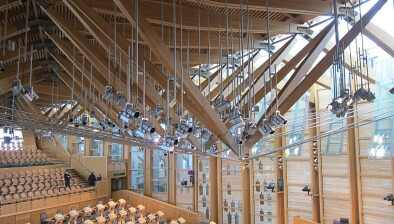Tenants and trade unions call for rent controls commitment

Scotland’s trade union leaders and Living Rent have urged the Scottish Government to reaffirm its commitment to introducing rent controls.
In an open letter first minister John Swinney, housing minister Paul McLennan, and cabinet secretary Shirley Ann Sommerville, the tenants’ union along with leaders from the Scottish Trade Union Congress, UNISON, Unite, RMT GMB, UCU, PCS, ASLEF and NUS say that if this government is serious about ending the housing emergency and child poverty, robust rent controls need to be part of the solution.
The letter adds that “unaffordable rents are a key driver of poverty” and that the Scottish Government has a chance to show what a “progressive response to the housing crisis looks like”.
Polling last week from Future Economy Scotland has found that the majority of people in Scotland support rent controls. Support is particularly high among SNP voters (90%) and Labour voters (88%). Though a majority of Conservative voters (61%) support rent control.
Housing costs are the largest financial outgoing in most households and Scotland’s lowest paid workers pay up to 50% or more of their take home pay, on housing.
Signatories to the letter included Roz Foyer, general secretary, Scottish Trades Union Congress; Lilian Macer, regional secretary, UNISON Scotland; Derek Thomson, Unite Scottish secretary; Gordon Martin, RMT Scotland regional organiser; Louise Gilmour, secretary, GMB Scotland, Jeanette Findlay, president, UCU Scotland; Mick Whelan, ASLEF general secretary; John Jamieson on behalf of PCS Scottish Sector Committee, and Sai Viswanathan, president NUS Scotland.
They point to “extortionate” rent increases experienced in Scotland in the last ten years. Data from the Scottish Government published in November revealed that between 2010 and 2023, rents across Scotland have increased on average 51.6%. In some local authorities, increases are even sharper. In Lothian rent increased 79.3%, and in Greater Glasgow rent increased 86.2%. By contrast, inflation was 45.7% during the same period.
Over 2023 new rents across Scotland increased by 14.3% to an average of £841 per month. In Greater Glasgow, rents rose by 22.3% to average £1050 per month, in Lothian, rents rose by 18.4% to average £1192.
Homelessness stemming from the private sector has increased by 22% since 2022. In 2024, the Scottish Homelessness Monitor suggests that homelessness could rise by a third (33%).
Due to the pressure of unaffordable rents, rising homelessness, lack of social housing and chronic disrepair, eight local authorities and the Scottish government have declared housing emergencies.
Living Rent’s national campaigns officer, Ruth Gilbert said: “Tenants need rent controls. Decades of poor regulation and a reliance on the free market has seen landlords hike up rents to eye-watering prices. Meanwhile, our wages have stagnated and the cost of living overall has pushed people further into poverty.
“Current regulation is simply not strong enough. Every day landlords are hiking up already unaffordable rents. They cannot be trusted to regulate themselves.
“International evidence shows that rent controls decrease inequality, improve private tenants’ security of tenure, and improve the quality of housing stock overall.
“The government has already published their plans for innovative, bold, and effective rent controls. They now need to put their money where their mouth is and commit to introducing rent controls - as promised before the end of this Parliament - to ensure that Scotland’s housing meets the needs of tenants.”
STUC general secretary, Roz Foyer, said: “The Scottish Government may have declared a housing emergency, but if that is to mean more than words, then it is absolutely crucial that it comes with both investment in social housing and regulation of rents.
“Housing is a human right and rather than bow to pressure from landlords, the Scottish Government must implement a proper system of rent controls.”
Lilian Macer, regional secretary, UNISON Scotland, said: “High private rents and house prices are pricing public service workers out of housing right across Scotland. Our younger members especially experience high rents, insecurity and poor-quality accommodation in the private rented sector PRS.
“They tell us that they are struggling with their rent, are unable to get a mortgage and have given up on getting social housing. We are supportive of the measures currently contained in the Housing Bill and can see no valid reason for diluting or abandoning any of them.”
Jeanette Findlay, president, UCU Scotland, said: “The private rented sector is a major housing provider for both university staff and students. We’ve heard from members about the broken housing system in Scotland and the need for better security for tenants and for affordable rents. Rent controls are an important part of this and we’d urge the Scottish Government to stick to their promises and build a housing system that works for tenants.”
Sai Shraddha S. Viswanathan, president, NUS Scotland, added: “I’ve signed this letter on behalf of Scotland’s student movement because students and apprentices urgently need to see action to tackle the housing emergency and bring rents under control.
“Our research has found that a shocking 12% of students have experienced homelessness, a rate higher than that of the general population. Horrifyingly, that figure rises to 25% for students with experience of the care system – showing that it is the most vulnerable in our society paying the price for extortionate rents.
“Students will never be able to learn and thrive when we can’t even find an affordable place to live because the housing system is putting profit over people. We need the Scottish Government to work to strengthen planned rent controls and expand them to include student accommodation, anything less than this would be an abandonment of their responsibility to students, apprentices and young people.”








